|
|
|
Sort Order |
|
|
|
Items / Page
|
|
|
|
|
|
|
| Srl | Item |
| 1 |
ID:
107981
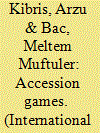

|
|
|
|
|
| Publication |
2011.
|
| Summary/Abstract |
We analyze the EU enlargement process from a rational institutionalist perspective and argue that the accession negotiations are designed to resolve the uncertainty that the existing EU members have in terms of the candidate's preferences. We model the negotiations as a Bayesian game and demonstrate how exactly the design in place helps the European Union in gathering information about the candidate country. Our model also enables us to compare alternative negotiation designs in terms of their ability to alleviate informational problems. We compare the resulting equilibrium payoffs under different negotiation designs to see whether there is any ground for a player to prefer a particular design over others. Our analysis supports the earlier arguments in the literature about the informative role of accession negotiations and demonstrates how exactly the negotiations carry out this role.
|
|
|
|
|
|
|
|
|
|
|
|
|
|
|
|
| 2 |
ID:
054387
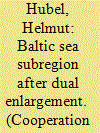

|
|
|
| 3 |
ID:
075250
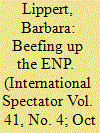

|
|
|
|
|
| Publication |
2006.
|
| Summary/Abstract |
Lippert examines more broadly EU policies towards its eastern neighbours, suggesting an alternative model with which to embed these countries in the EU system of governance. Lippert argues that a path dependency and the lack of a foreign policy focus lie at the root of the inbuilt fallacies of the ENP. Indeed, the ENP in principle purports to envisage a new type of relationship, distinct from the model of economic integration (for example, the European Economic Area) or that of accession or of association/partnership. Yet in practice, having been articulated as a form of "membership minus" that denies any form of institutional participation, the ENP cannot significantly contribute to the modernisation and stabilisation objectives to which it aspires. To escape this bind, Lippert suggests that, for those eastern neighbours who could in principle have the option of membership but are in practice far removed from it, the EU, in addition to its bilateral contractual ties, should establish an overarching institutional framework: a European Confederation of Tasks (Confed Europe). Confed Europe could act as an institutional process, tackling and striving to reach a common purpose on key policy issues in the political, economic and security realms.
|
|
|
|
|
|
|
|
|
|
|
|
|
|
|
|
| 4 |
ID:
070921
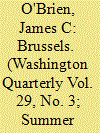

|
|
|
|
|
| Publication |
2006.
|
| Summary/Abstract |
In three or four years, European leaders will face a choice: live up to their own rhetoric in favor of enlargement to the western Balkans or bow to public expectations. Both the outcome and even the tone of the debate could have repercussions with criminal and security risks for Europe.
|
|
|
|
|
|
|
|
|
|
|
|
|
|
|
|
| 5 |
ID:
053385
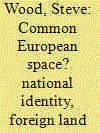

|
|
|
|
|
| Publication |
Autumn 2004.
|
| Summary/Abstract |
In central and eastern Europe, symbiosis between particular ethnic-cultural nations and territorial areas is understood as corresponding to a natural and moral order. European Union enlargement challenges this mindset by legally transforming ‘national territory’ into ‘supranational’ real property or even opening the possibility of restitution claims by ‘foreigners’. In the Polish and Czech cases this is highly contentious, principally due to the prospect of Germans and/or Austrians obtaining land. Rather than representing prosaic exchange among neutral economic agents the issue is embroiled in a complex of political and emotive influences, with historical roots that run deeper than the communist era. Realisation of a common European legal order is accompanied and to some extent hindered by misgivings about a liberal space of free access, unrestricted capital movement and no discrimination on grounds of nationality.
|
|
|
|
|
|
|
|
|
|
|
|
|
|
|
|
| 6 |
ID:
052557
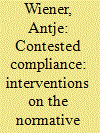

|
|
|
| 7 |
ID:
070915
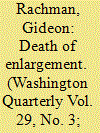

|
|
|
|
|
| Publication |
2006.
|
| Summary/Abstract |
The potential death of the EU enlargement process is a huge blow to the goals of spreading prosperity and democracy in Europe. Nevertheless, the prospect of membership has still not completely lost its potency to spur reform. The risk is that all parties involved might suffer a bitter disillusionment in the end.
|
|
|
|
|
|
|
|
|
|
|
|
|
|
|
|
| 8 |
ID:
052738
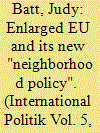

|
|
|
| 9 |
ID:
053679
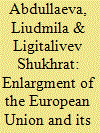

|
|
|
| 10 |
ID:
018751
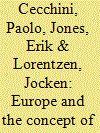

|
|
|
|
|
| Publication |
2001.
|
| Description |
p155-166
|
|
|
|
|
|
|
|
|
|
|
|
|
|
|
|
| 11 |
ID:
113727


|
|
|
|
|
| Publication |
2012.
|
| Summary/Abstract |
Minority rights conditionality has been seen by scholars as a key part of the EU enlargement process. While the focus on minority rights has largely been discussed in terms of democracy and even human rights, this article argues that conditionality was a result of the securitization of minorities rather than part of an agenda to protect or empower. In this article, we look at the methods of desecuritization as factors of 'narratives, norms and nannies'. In response to Paul Roe's conclusions about the impossibility of desecuritizing societal security, we examine whether the EU, the Organization for Security and Co-operation in Europe (OSCE) and the Council of Europe have the ability to change the societal dynamics among ethnic groups in such a way as to make the desecuritization of societal security more likely. Overall, we illustrate how a focus on 'deconstructivist' and 'constructivist' approaches to societal security has failed to make European organizations important transformative actors in interethnic relations.
|
|
|
|
|
|
|
|
|
|
|
|
|
|
|
|
| 12 |
ID:
053680
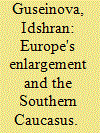

|
|
|
| 13 |
ID:
091437
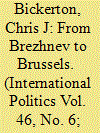

|
|
|
|
|
| Publication |
2009.
|
| Summary/Abstract |
The year 1989 is widely fêted as a turning point in the history of Eastern Europe: nation-states were liberated from the tyranny of Soviet rule and regained their sovereign independence. This article challenges the conventional wisdom by arguing that the 'limited sovereignty' of the pre-1989 period, formally declared by Leonid Brezhnev in 1968, has been replaced by a new form of domination, this time from Brussels. However, while Eastern European states still face constraints on their political autonomy and self-government, the nature of this domination is different. Specifically, it coincides with the post-Cold War revision of the concept of sovereignty itself, where the attachment to the formal rights of sovereign independence and equality is lost. Eastern European states have found that continued limitations upon their sovereignty are today celebrated as the realization of the essence of sovereignty itself.
|
|
|
|
|
|
|
|
|
|
|
|
|
|
|
|
| 14 |
ID:
174018


|
|
|
|
|
| Summary/Abstract |
This paper seeks to uncover what drives European Parliament (EP) discussions on a privileged partnership for Turkey. In line with Habermas’s Communicative Action Theory, it scrutinizes the justifications used by the Members of the European Parliament (MEPs) in the Plenary Sessions between 2005–2012, i.e. from the start of accession negotiations until the privileged partnership’s falling into disuse in EP discussions. The research reveals that the alleged benefits of privileged partnership in contrast to the costs of Turkey’s full membership constitute the backbone of the right-wing groups’ arguments whereas the objection to a privileged partnership is justified by MEPs from left-wing groups for being against the EU’s official commitments to Turkey. In disputing Turkey’s full membership, the members of the right-wing parties reconstruct a European identity in which Turkey is the constitutive other.
|
|
|
|
|
|
|
|
|
|
|
|
|
|
|
|
| 15 |
ID:
086302
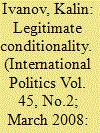

|
|
|
|
|
| Publication |
2008.
|
| Summary/Abstract |
This article analyzes European Union (EU) conditionality regarding the safety of Central and East European nuclear power reactors. Bulgaria, Lithuania, and Slovakia breached or evaded shutdown pledges made in exchange for foreign aid in the early 1990s. Conditionality proved more effective when the European Commission required reactor closure as a condition for accession. However, EU pressure gave rise to legitimacy concerns, as candidate country governments agreed to phase out reactors against the wishes of their citizens. The resultant problems exposed inherent discrepancies between conditionality and democracy. Such discrepancies cannot be resolved by the illusory concept of 'ownership'. Bridging two literatures, the article examines EU conditionality in the context of enlargement's 'democratic deficit'. Previously overlooked factors that discredit conditionality include stereotyping, symbolism, the reluctance to admit mistakes, and popular conspiracy theories about donor motives. Greater attentiveness to such factors can enhance conditionality's legitimacy.
|
|
|
|
|
|
|
|
|
|
|
|
|
|
|
|
| 16 |
ID:
174570
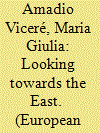

|
|
|
|
|
| Summary/Abstract |
My article addresses the role of the two post-Lisbon High Representatives (HRs), Catherine Ashton and Federica Mogherini, in EU approach to the Eastern neighbourhood. Adopting a broad conceptualisation of EU foreign policy and drawing on the scholarly literature on new intergovernmentalism, it focuses on events that marked the HRs' mandates in the cases of Kosovo and Ukraine. In the case of Kosovo, it examines the HRs' role in the conclusion of the so-called Brussels Agreement (April 2013); and of the August 2015 agreements. In the case of Ukraine, it reconstructs how the HRs dealt with the events leading up to the November 2013 Vilnius Summit; and with those leading up to the conclusion in February 2015 of the Minsk II Agreement. The article argues that the European Council exerts tight control over the post-Lisbon HR, and EU foreign policy-making processes more generally. Nonetheless, the empirical analysis demonstrates that, under certain circumstance, the HR can significantly influence EU foreign policy in the post-Lisbon era.
|
|
|
|
|
|
|
|
|
|
|
|
|
|
|
|
| 17 |
ID:
099890
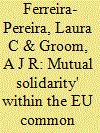

|
|
|
|
|
| Publication |
2010.
|
| Summary/Abstract |
This article assesses the effective meaning, scope and implications of intra-Community solidarity in the security and defence area. It touches on the genealogy of the conception of solidarity and its various interpretations as well as both the tensions this entails and impediments this creates for development of a common security and defence policy. It concludes that political solidarity has been gradually taking root on the basis of a common shared modus vivendi, although not without embarrassing setbacks. Military solidarity is more than a mirage but not yet a firmly based reality given the existence in the European Union of distinct foreign and security policy identities shaped by traditionally defined national interests that still dominate intergovernmental cooperation in the area.
|
|
|
|
|
|
|
|
|
|
|
|
|
|
|
|
| 18 |
ID:
087088
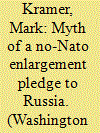

|
|
|
|
|
| Publication |
2009.
|
| Summary/Abstract |
In the latter half of the 1990s, as the North Atlantic Treaty Organization (NATO) was preparing to expand its membership for the first time since the admission of Spain in 1982, Russian officials claimed that the entry of former Warsaw Pact countries into NATO would violate a solemn ''pledge'' made by the governments of West Germany and the United States in 1990 not to bring any former Communist states into the alliance.1 Anatolii Adamishin, who was Soviet deputy foreign minister in 1990, claimed in 1997 that ''we were told during the German reunification process that NATO would not expand.'' Other former Soviet officials, including Mikhail Gorbachev, made similar assertions in 1996-1997
|
|
|
|
|
|
|
|
|
|
|
|
|
|
|
|
| 19 |
ID:
153843
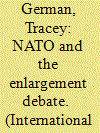

|
|
|
|
|
| Summary/Abstract |
The enlargements of the post-Cold War era have undermined NATO's stated objectives vis-à-vis the purpose of incorporating new members and exposed tensions within the alliance over the twin pillars of the 1967 Harmel Report, namely deterrence and dialogue. NATO's stance on enlargement has not only undermined Euro-Atlantic security and triggered new divisions between East and West, it has also exposed aspirant states, particularly those in the post-Soviet space, to sustained pressure and coercion from Moscow. This article examines the rationale for NATO enlargement in the post-Cold War era, focusing on the two post-Soviet aspirant states, Georgia and Ukraine. While these two states contribute, as partners, to the alliance's efforts to advance cooperative security, the issue of their prospective membership threatens to undermine alliance security and cohesion, and their ambitions are therefore unlikely to be realized in the foreseeable future. With Russia taking an increasingly assertive stance on the global stage and uncertainty surrounding the direction of US foreign policy under the presidency of Donald Trump, the issue of NATO enlargement is unlikely to be a priority for the alliance over the next few years. If NATO ultimately rejects any prospect of membership for states in the post-Soviet space, they could be abandoned to Russian influence, indicating that Moscow has a de facto veto over membership of the alliance and conceding spheres of influence to Russia.
|
|
|
|
|
|
|
|
|
|
|
|
|
|
|
|
| 20 |
ID:
060801
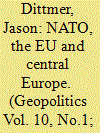

|
|
|
|
|
| Publication |
2005.
|
| Summary/Abstract |
This essay investigates the contemporary evolution of the symbolic shape of Central Europe by conducting a quantitative and qualitative content analysis of newspaper articles from the Lexis–Nexis database covering NATO and EU expansion. The results of this content analysis show that Central Europe is associated with different symbolic shapes at different times and in different political contexts, and therefore the idea of one hegemonic Central Europe, either transcending time and context or tied to an institutional identity, is a fallacy. ‘Central Europe’ has shaped NATO and EU expansions, but similarly those processes have constructed differing geopolitical images of Central Europe that are mediated to the consumers of the newspapers. In contrast to these differing symbolic shapes, a series of common structures of expectation were associated with Central Europe that constructed the region as different from Eastern Europe
|
|
|
|
|
|
|
|
|
|
|
|
|
|
|
|
|
|
|
|
|